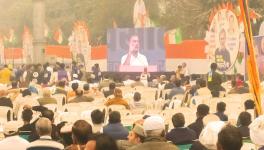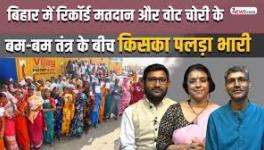Politics: Congress a Victim of Ideological Crisis and Opportunism
The infighting and rifts among Congress party leaders in different states are weakening it. In the run-up to nine crucial Assembly elections, domestic battles among regional satraps are also lowering the heft and status of its central leadership. As a result, not just leaders of its rival Bharatiya Janata Party, even Opposition party members are questioning its preparedness to lead a united front. And they are wondering how, if the Congress house is not in order, it will thrash out a national consensus for the 2024 Lok Sabha polls.
A Congress government is in power only in a handful of states, including Punjab, Rajasthan and Chhattisgarh. In Maharashtra, Tamil Nadu and Jharkhand, it is part of a coalition government. So, the party has precious little to offer or promise to its state leaders. To succeed at the grassroots, it must work hard among the masses, but many Congress leaders seem ready for this either. If the Congress keeps securing electoral victories, it can hand out the fruits of power to rank and file. If it loses, it will continue to bleed leaders. Not many who steer the party’s regional outfits seem prepared to go on like this. They are keener to secure position and acquire status, even in an Opposition outfit, rather than fight for democracy, the Constitution, secularism. Nor are they enthusiastically raising issues that have immediate resonance, such as rising inflation, unemployment, and poverty.
Many have, instead, exited the party in recent times, including Jyotiraditya Scindia, Jitin Prasada and Sushmita Deb, who switched sides as soon as they got the opportunity. Scindia even toppled the government that his former party had struggled for 15 years to create. These leaders were very close to Rahul Gandhi, so the question arises, why did they have no faith in the Congress ideology and policies? There still are rumblings of dissent, and more leaders are said to be weighing their options. Some are apparently keen to join the BJP just before the Uttar Pradesh Assembly election.
Tussles over the chief minister's post in Chhattisgarh and Rajasthan are also on, destabilising the party. In July last year, the then deputy chief minister and state party president Sachin Pilot and some MLAs close to him sounded rebellion in Rajasthan. The Congress party’s strength is its liberalism—its leaders generally air contrarian views and attempt to undercut each other within the organisation—but this is now turning into its Achilles’ heel.
Congress leaders are perhaps feeling the heat of raids conducted against them and other Opposition party members by central investigative agencies. Last year, during the peak of the Pilot-Gehlot crisis, people close to the chief minister, including his brother, got raided. Then, in an evident bid to prevent horse-trading, the Congress had to pack its MLAs into hotels for several days. Party general secretary Priyanka Vadra Gandhi resolved the crisis after speaking with Pilot. But Pilot has started thrashing against the bit again, and the party is waiting and watching.
During the Covid-19 crisis, when party chief Sonia Gandhi was unwell, and the fire in Rajasthan was still burning, 23 party leaders (“G23”) wrote to her, raising questions on the party leadership. Their letter was leaked to the media. Not just this. There is news of a confrontation between Chhattisgarh Chief Minister Bhupesh Baghel and state Health Minister TS Singh Deo. In Chhattisgarh, the Congress had a thumping majority in 2018 after a 15-year stint in opposition. But on 20 June, just two-and-a-half years later, Deo broadcast his discontent, that too on Twitter.
The situation kept snowballing until on 27 August, Baghel came to Delhi to meet Rahul, in a veritable show of strength, accompanied by about three dozen MLAs, five mayors and several state officials. After two meetings in a week, the party high command managed to paper over the crisis, but Deo does not seem appeased. There is every possibility of the crisis erupting in Chhattisgarh again, as is evident in renewed discussions between the central command and Deo after the settlement. According to the grapevine, when the Congress formed government in Chhattisgarh, it had assured both Deo and Baghel they would be chief ministers for two-and-a-half-years each.
In Punjab, the new state president Navjot Singh Sidhu refuses to stop taking potshots against Chief Minister Captain Amarinder Singh. The Captain camp had vehemently opposed Sidhu's recent elevation, but the Congress command wanted to signal that its writ still runs large over the state unit and did not relent. The party, however, decided to fight the next Assembly election under Singh’s command. Still, the two are quarrelling every day and in full public glare. If this continues, the Congress will have to prepare for significant losses in the three-cornered Punjab election.
The godi media is thrilled over these developments, for it suits them that the main opposition party looks shabby and irrelevant. The Congress top brass is continuously trying to launch political, economic and social campaigns against the BJP and RSS. Indeed, the entire Opposition seems united in the belief that only a joint struggle that raises the myriad issues that concern people can stand a chance against the BJP in the electoral hustings. Even farmers, the unemployed, families crushed under inflation, the growing ranks of the poor, and those who oppose disinvestment need just a nudge to fall in line behind a non-BJP formation. However, the see-saw in the Congress is sending mixed signals to them. Rahul Gandhi was active during the recent Parliament session. He held meetings with Opposition leaders on farmers’ concerns and the Pegasus spying scandal. He marched to Parliament and attended the farmer protests at Jantar Mantar along with other leaders. Yet he did not get the responses from within his party that his party would have liked. After the Parliament session, party president Sonia Gandhi discussed strategy with Opposition leaders too. So, there are several measures and plans, each announced in good faith, but if Congress leaders and workers do not stand behind their ideology firmly, why would others join them? The G23 leaders are still in the Congress party, but their activism is not visible on street-corners or in peoples’ struggles.
If the top leadership initiates a project or plan, the party’s prominent leaders do not seem to back it whole-heartedly. For example, Rahul Gandhi raised the Rafale scam vigorously, but he seemed quite alone. Similarly, some leaders do not consider Gandhi’s sharp takes on the BJP's “crony capitalism” and “bourgeois friends” appropriate. (Though they do not dare openly say so.) When Rahul raised questions on Prime Minister Narendra Modi and his policies, prominent leader Shashi Tharoor had advised not to criticise Modi. Milind Deora, considered close to the Gandhi family, has expressed admiration for Modi. Former Union minister Jairam Ramesh praised the Modi government’s Ujjwala scheme. Another key leader, Salman Khurshid, praised the Ayushman Bharat scheme. In February, when the Congress was trying to corner the government on the farmer protests, Leader of Opposition Ghulam Nabi Azad was tearing up in the Rajya Sabha hearing Modi’s emotional farewell speech. The optics aren’t right, even if the intentions are.
Many more examples show that the internal situation in the Congress isn’t quite right. Whether or not this is a part of Congress culture, it does not signal that the party can lead a united Opposition soon. Lately, Rahul Gandhi said unemployment and inflation concern most people, and the Youth Congress cadres hit the streets, spreading the party’s message. Now the Congress has sounded the bugle against the public sector sell-off. And once again, only the Youth Congress has organised a few demonstrations against disinvestment.
The Congress central leadership is fully aware of shortcomings in the organisation but takes no concrete steps to rectify them. Sonia Gandhi has been in charge ever since Rahul Gandhi resigned as Congress President after the crushing defeat in the 2019 Lok Sabha election. After all this time, the party is yet to pick a full-time president. Even though Rahul is taking big decisions for the party, he is unwilling to lead from the front. The party filled many key organisational posts over the last two years, but the new appointments have hardly made a flutter. Partly, it is the compliant media to blame, which has consistently underplayed Congress and all Opposition events and announcements. That said, the Congress is raising burning issues—and the Opposition is supporting it—but domestic squabbles are holding it back. It is unable to convert a call into a campaign or a campaign into a movement. Assembly elections are due in nine states in 2022 and 2023, including in Uttar Pradesh, Karnataka, Chhattisgarh, Madhya Pradesh, Telangana and Nagaland in a matter of months. That will lead into the final tussle for the 2024 General Election, and one can only hope to find the Congress better prepared by then.
The author is an independent journalist. The views are personal.
Get the latest reports & analysis with people's perspective on Protests, movements & deep analytical videos, discussions of the current affairs in your Telegram app. Subscribe to NewsClick's Telegram channel & get Real-Time updates on stories, as they get published on our website.
























